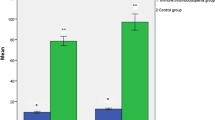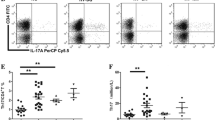Abstract
Introduction
Indoleamine 2,3-dioxygenase (IDO) can promote peripheral immune tolerance and control autoimmune responses through tryptophan catabolism. Tryptophanyl-tRNA synthetase (TTS) can protect T cells from IDO-mediated cell injury. Impaired IDO-mediated tryptophan catabolism has been observed in some autoimmune diseases.
Materials and Methods
The concentrations of plasma kynurenine and tryptophan were detected by high-pressure liquid chromatography. The expressions of IDO and TTS were analyzed by real-time quantitative polymerase chain reaction and flow cytometry.
Results
Compared with healthy controls, the PBMCs of patients with immune thrombocytopenia (ITP) had significantly increased expressions of IDO and TTS, especially IDO. However, the plasma tryptophan concentration was significantly elevated, and kynurenine concentration was significantly reduced in ITP patients. In CD4+ and CD8+ T cells of the ITP patients, IDO expressions were significantly lower than those in healthy controls, but in CD19+ and CD14+ cells, IDO expression significantly increased. Conversely, TTS expressions in CD4+ and CD8+ T cells of the ITP patients were significantly higher than those in healthy controls, but there was no difference either in CD19+ or CD14+ cells.
Conclusion
These results suggest that the activity of IDO enzyme is insufficient in ITP patients. Increased TTS expressions from CD4+ and CD8+ T cells might link to a pathogenic mechanism involved in increasing survival of autoreactive T cells in ITP patients.



Similar content being viewed by others
References
McMillan R. The pathogenesis of chronic immune thrombocytopenic purpura. Semin Hematol. 2007;44(4 suppl 5):S3–S11.
Gernsheimer T. Chronic idiopathic thrombocytopenic purpura: mechanisms of pathogenesis. Oncologist. 2009;14:12–21.
Mellor AL, Keskin DB, Johnson T, Chandler P, Munn DH. Cells expressing indoleamine 2,3-dioxygenase inhibit T cell responses. J Immunol. 2002;168:3771–6.
Munn DH, Sharma MD, Lee JR, Jhaver KG, Johnson TS, Keskin DB, et al. Potential regulatory function of human dendritic cells expressing indoleamine 2,3-dioxygenase. Science. 2002;297:1867–70.
Fallarino F, Grohmann U, Vacca C, Bianchi R, Orabona C, Spreca A, et al. T cell apoptosis by tryptophan catabolism. Cell Death Differ. 2002;9:1069–77.
Frumento G, Rotondo R, Tonetti M, Damonte G, Benatti U, Ferrara GB. Tryptophan-derived catabolites are responsible for inhibition of T and natural killer cell proliferation induced by indoleamine 2,3-dioxygenase. J Exp Med. 2002;196:459–68.
von Rango U. Fetal tolerance in human pregnancy—a crucial balance between acceptance and limitation of trophoblast invasion. Immunol Lett. 2008;115:21–32.
Jia L, Tian P, Ding C. Immunoregulatory effects of indoleamine 2, 3-dioxygenase in transplantation. Transpl Immunol. 2009;21:18–22.
Munn DH, Mellor AL. Indoleamine 2,3-dioxygenase and tumor-induced tolerance. J Clin Invest. 2007;117:1147–54.
Friberg M, Jennings R, Alsarraj M, Dessureault S, Cantor A, Extermann M, et al. Indoleamine 2,3-dioxygenase contributes to tumor cell evasion of T cell-mediated rejection. Int J Cancer. 2002;101:151–5.
Munn DH, Sharma MD, Hou D, Baban B, Lee JR, Antonia SJ, et al. Expression of indoleamine 2,3-dioxygenase by plasmacytoid dendritic cells in tumor-draining lymph nodes. J Clin Invest. 2004;114:280–90.
Grohmann U, Fallarino F, Bianchi R, Orabona C, Vacca C, Fioretti MC, et al. A defect in tryptophan catabolism impairs tolerance in nonobese diabetic mice. J Exp Med. 2003;198:153–60.
Sakurai K, Zou JP, Tschetter JR, et al. Effect of indoleamine 2,3-dioxygenase on induction of experimental autoimmune encephalomyelitis. J Neuroimmunol. 2002;129(1–2):186–96.
Wang S, Mao C, Zhao Z, Gu Q, Jin M, Xiao Y, et al. Increased TTS abrogates IDO-mediated CD4+ T cells suppression in patients with Graves’ disease. Endocr. 2009;36:119–25.
Zhu L, Ji F, Wang Y, Zhang Y, Liu Q, Zhang JZ, et al. Synovial autoreactive T cells in rheumatoid arthritis resist IDO-mediated inhibition. J Immunol. 2006;177:8226–33.
Fleckner J, Martensen PM, Tolstrup AB, Kjeldgaard NO, Justesen J. Differential regulation of the human, interferon inducible tryptophanyl-tRNA synthetase by various cytokines in cell lines. Cytokine. 1995;7:70–7.
Murray MF. Tryptophan depletion and HIV infection: a metabolic link to pathogenesis. Lancet Infect Dis. 2003;3:644–52.
Boasso A, Herbeuval JP, Hardy AW, Winkler C, Shearer GM. Regulation of indoleamine 2,3-dioxygenase and tryptophanyl-tRNA-synthetase by CTLA-4-Fc in human CD4+ T cells. Blood. 2005;105:1574–81.
Rodeghiero F, Stasi R, Gernsheimer T, Michel M, Provan D, Arnold DM, et al. Standardization of terminology, definitions and outcome criteria in immune thrombocytopenic purpura of adults and children: report from an international working group. Blood. 2009;113:2386–93.
Widner B, Werner ER, Schennach H, Wachter H, Fuchs D. Simultaneous measurement of serum tryptophan and kynurenine by HPLC. Clin Chem. 1997;43:2424–6.
Semple JW, Milev Y, Cosgrave D, Mody M, Hornstein A, Blanchette V, et al. Differences in serum cytokine levels in acute and chronic autoimmune thrombocytopenic purpura: relationship to platelet phenotype and antiplatelet T-cell reactivity. Blood. 1996;87:4245–54.
Guo C, Chu X, Shi Y, He W, Li L, Wang L, et al. Correction of Th1-dominant cytokine profiles by high-dose dexamethasone in patients with chronic idiopathic thrombocytopenic purpura. J Clin Immunol. 2007;27:557–62.
Thomas SR, Terentis AC, Cai H, Takikawa O, Levina A, Lay PA, et al. Post-translational regulation of human indoleamine 2,3-dioxygenase activity by nitric oxide. J Biol Chem. 2007;282:23778–87.
Munn DH, Sharma MD, Mellor AL. Ligation of B7-1/B7-2 by human CD4(+) T cells triggers indoleamine 2,3-dioxygenase activity in dendritic cells. J Immunol. 2004;172:4100–10.
Thomas SR, Salahifar H, Mashima R, Hunt NH, Richardson DR, Stocker R. Antioxidants inhibit indoleamine 2,3-dioxygenase in IFN-g-activated human macrophages: posttranslational regulation by pyrrolidine dithiocarbamate. J Immunol. 2001;166:6332–40.
Kudo Y, Boyd CA. Characterization of L-tryptophan transporters in human placenta: a comparison of brush border and basal membrane vesicles. J Physiol. 2001;531:405–16.
Praetorius-Ibba M, Stange-Thomann N, Kitabatake M, Ali K, Söll I, Carter Jr CW, et al. Ancient adaptation of the active site of tryptophanyl-tRNA synthetase for tryptophan binding. Biochemistry. 2002;39:13136–41.
Kudo Y, Boyd CA. Human placental indoleamine 2,3-dioxygenase:cellular localization and characterization of an enzyme preventing fetal rejection. Biochim Biophys Acta. 2000;1500:119–24.
Rubin BY, Anderson SL, Xing L, Powell RJ, Tate WP. Interferon induces tryptophanyl-tRNA synthetase expression in human fibroblasts. J Biol Chem. 1991;266:24245–8.
Tolstrup AB, Bejder A, Fleckner J, Justesen J. Transcriptional regulation of the interferon-gamma-inducible tryptophanyl-tRNA synthetase includes alternative splicing. J Biol Chem. 1995;270:397–403.
Jorgensen R, Sogaard TM, Rossing AB, Martensen PM, Justesen J. Identification and characterization of human mitochondrial tryptophanyl-tRNA synthetase. J Biol Chem. 2000;275:16820–6.
Acknowledgments
This work was supported by grants from National Natural Science Foundation of China (nos. 81070408, 81070411, 30570779, 30770922, 81070407, 30971278, and 81070396), the National 973 Basic Research Program of China (grant 2011CB503906), Foundation for the Author of National Excellent Doctoral Dissertation of PR China (no. 200561), Program for New Century Excellent Talents in University (NCET-07-0514), Key Project of Chinese Ministry of Education (109097), Key Clinical Research Project of Public Health Ministry of China 2010–2012, Outstanding Young Scientist Research Award Foundation of Shandong Province (2008BSO3009, BS2010YY024), Natural Science Foundation of Shandong Province (ZR2009CM001, ZR2010HQ002), Clinical Medicine Center Foundation of Shandong Province, Leading Medical Professionals Foundation of Shandong Province, Tai Shan Scholar Foundation, Independent Innovation Foundation of Shandong University (no. 2009TS053), and State Program of National Natural Science Foundation of China for Innovative Research Group (81021001).
Author information
Authors and Affiliations
Corresponding author
Additional information
Chun-yan Wang, Yan Shi, and Ya-nan Min contributed equally to this work.
Rights and permissions
About this article
Cite this article
Wang, Cy., Shi, Y., Min, Yn. et al. Decreased IDO Activity and Increased TTS Expression Break Immune Tolerance in Patients with Immune Thrombocytopenia. J Clin Immunol 31, 643–649 (2011). https://doi.org/10.1007/s10875-011-9525-7
Received:
Accepted:
Published:
Issue Date:
DOI: https://doi.org/10.1007/s10875-011-9525-7




